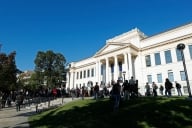You have /5 articles left.
Sign up for a free account or log in.
There are a series of revolutions going on in science and technology -- and in the way they are taught and conducted in American higher education. Traditional lectures are being replaced with more active learning. Graduate students are being taught to teach, not just do research. And interdisciplinarity is key. Many proponents of these changes -- while passionate about their importance -- say that much of the innovation isn't coming from the traditional leaders of American science (top research universities), but from a range of other institutions.
That could be changing -- dramatically -- with a report released Friday by Harvard University, calling for substantial shifts in the way science is taught and the way faculty members are hired. The report -- by a faculty panel from divisions throughout the university -- describes Harvard as failing to meet its potential because of barriers to collaboration and outdated ideas about teaching. Harvard is known -- even among other research universities -- for being exceptionally decentralized, with deans, department heads and even lab directors guarding their turf. If the report's recommendations go anywhere, that reputation could change.
The report comes as Harvard is preparing to build a major new campus in Allston, to expand its engineering program, and to search for a new president. Lawrence H. Summers, who just left the presidency, was a strong advocate for Harvard paying more attention to science. Derek Bok, a former president who is back in office while the search is going on, sent Harvard professors a letter Friday indicating that a review of the recommendations would proceed now. And he urged faculty members to approach the review "with a spirited willingness to embrace changes."
Harvard's wealth (its endowment is No. 1 in academe and nobody else comes close) may enable the university to make the changes the faculty panel is seeking through growth, and not just through reallocation.
For example, the report calls for the creation of 75 new full-time interdiciplinary professor slots in the next decade. In a huge break with Harvard tradition, the hiring and setting of research and teaching priorities would not come from individual departments, but from a new committee that would include administrators and faculty members from several Harvard colleges that deal with science. The committee would also help determine universitywide research priorities and allocation of laboratory and other space.
The report goes out of its way to also note the importance of strengthening traditional science disciplines as well. But it says that the only way to truly encourage interdisciplinary work is to change the power structure at the university. For the committee "to be a legitimate and effective body, it must be empowered with control of FTEs, space and funding from its inception," the report says.
Not surprisingly, given the downfall of Summers, the report says that this new committee should be diverse not only in scientific fields represented, but also in gender and race -- and that it should explicitly take steps to seek out diverse applicant pools for the new slots.
The panel that prepared the report also considered the question of power and effectiveness in examining teaching issues. For example, the report says that graduate students face far too much pressure to work only with faculty members in the departments that admitted them and that are providing their scholarships and stipends. This makes it impossible to encourage interdisciplinary work early in researchers' careers, the report says.
To deal with this, the report recommends that Harvard make first-year support of graduate students independent of departmental resources, so those first decisions graduate students make about which professors to seek out are not limited by awareness of who is signing one's checks.
For undergraduate education, the major change recommended is a move away from traditional lectures and labs to a more exploratory laboratory environment. Beyond teaching laboratory skills, the lab experience needs to focus on "project-based efforts" in which students experience science, the report says. This approach will require more instructors and more space for labs, the report says.








